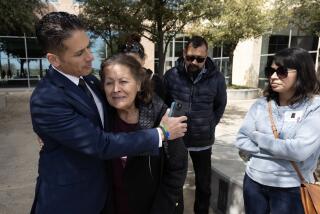Slain Child’s Brother Mired in Adoption Limbo
- Share via
CHICAGO — His 3-year-old brother, Joseph, was hanged with an extension cord. His mother will spend life in prison for murdering the boy.
And now, three years after the murder, Joshua Wallace--an “enchanting little guy” who likes the outdoors and Barney the Dinosaur--remains in child welfare limbo. The 4-year-old is still legally Amanda Wallace’s son, still without a family to call his own.
Freeing children like Joshua for adoption can be an arduous process. The Child Welfare League of America estimates that 45,000 youngsters are waiting to have their parental ties severed before becoming available for adoption.
“Every kid needs a warm, loving family and a warm, loving home,” said league director David Liederman. “The sooner they know what their environment is, what their support system is, who they can count on, the more chance they have of having some success in life. Kids that don’t have that are in huge trouble.”
If a child’s parents don’t object, a youngster can be eligible for adoption within a few weeks. But if parents are determined to fight for their child, or if other problems arise, a child can be trapped for years--like Joshua.
In 1993, Wallace, a woman with a long history of mental illness, tied a cord around Joseph’s neck, waved goodbye and hanged him. Joshua, then 15 months old, was a room away.
Since then, he has bounced from foster parents to a group home, to a foster mother who has no intention of adopting him. Another couple want to adopt Joshua, but a Sept. 17 court hearing is the soonest that Wallace’s parental rights could be terminated and the adoption process begun.
Critics blame prosecutors for delaying Joshua’s adoption by demanding Wallace’s conviction before terminating her parental rights. Wallace was sentenced last month.
But prosecutors say difficulty in determining who Joshua’s father is, whether Wallace’s relatives should have him, and whether Wallace herself was fit for a termination hearing has delayed the process.
That the boy has progressed from a baby to a preschooler without a permanent home outrages some child welfare advocates.
Bernardine Dohrn, director of the Children and Family Justice Center at Northwestern Law School, said the state should have pushed to find Joshua a permanent home over prosecuting his mother.
“The fact that there’s another child here who has a future is so much more important than the notion of vengeance,” Dohrn said. “Children need stability and permanency.”
In Joshua’s case, stability and permanency have been rare.
Authorities believe that he was conceived during one of Wallace’s many stays at a mental hospital. Born in 1992, he twice was placed in foster homes--once when a paramedic called to Wallace’s home found him about to choke on his own spit.
In 1993, two months before Joseph’s death, the children were returned to Wallace on the recommendation of a state caseworker.
A public outcry followed Joseph’s hanging. Child welfare law was changed to place children’s interests before those of their parents in custody decisions. Officials vowed that Joshua would meet a kinder fate than his brother.
Joshua was placed with a potential adoptive family but removed a year ago after officials determined that the couple weren’t meeting his emotional needs. He then went to a well-respected group home that treats children with special problems.
When Joshua arrived, he was insecure, had trouble sleeping and had behavioral problems including swearing, said Carol Ligenfelter, director of Hephzibah Children’s Assn.’s family-based services.
“Those are the type of problems we see with children who have had a lot of changes in their life,” Ligenfelter said. But with some “fairly intensive work,” including frequent therapy, Joshua’s behavior has improved greatly, she said.
“He’s really an enchanting little guy,” she said.
Joshua is living with an experienced foster mother who cares for two other foster children but is not interested in adoption. He could be moved again shortly to the home of yet another couple who want to adopt him.
The delay in finding Joshua a permanent home “is at best mysterious,” Dohrn said. “At worst, contemptible.”
More to Read
Sign up for Essential California
The most important California stories and recommendations in your inbox every morning.
You may occasionally receive promotional content from the Los Angeles Times.













